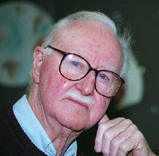| Narrators |
 |
Joseph Laffey
Interview and story by: Cayce Kenny |
Joe Laffey: A Teacher in the Sixties
Joseph Laffey was a very dedicated history teacher at South Kingstown High School during the 1960's and 1970's. Through his teaching experiences, he shows what high school life was like for the teachers and the students in 1968. This is his story.
It was interesting to be a teacher at that time because you saw students dividing up, you saw faculty dividing up. You saw this ongoing fight between the Hawks and the Doves. I can still remember some students protesting for the legalization of marijuana. We even had the Chief Justice of the Rhode Island Supreme Court come down to speak to an assembly of students here. It was amazing; the students peppered him with questions about the legalization of marijuana. As I said, It was interesting to be a teacher then.
I was born right here in Wakefield on December 31, 1922. I grew up in a family of five children, the second of five actually. Both my mother and father came from Ireland. My father originally came down here to work on the Narragansett Pier Railroad, but shortly after that he began working for the Hazard Estate, the place that is now the Oaks.
The oldest child in our family is our sister Mary, then I have a brother Ambrose, and a sister Teresa, and a sister Rheata. We all grew up in Peace Dale and live near Old Mountain Road.
I was raised Catholic, as both my mother and father were Catholic. As it turned out, I ended up going to a Catholic college, Boston College. Basically, my father and mother were Democrats. I can still remember going next door when there was a radio address by Al Smith, who was running for the Presidency in 1928. He ended up losing to Hoover because of the anti-Catholic prejudice. But nonetheless, [my parents] were strong Democrats, and I retained an identification with the Democratic Party.
When I was in high school we went to the movies and to dances. We didn't have a car until very late but I went out with people who did have cars. There were also social events at St. Francis Church. These events were like clubs, specifically designed for high school youngsters and I was very much a part of that.
Did you think about the threat of nuclear war a lot? And were you affected by the Cuban Missile Crisis?
I didn't think about the nuclear war a lot. As a teacher at Narragansett I remember having these air raids, where kids hid under the desks, and so forth. It was mentioned, but it wasn't a pressing or oppressing or depressing thing.
We were all affected by the Cuban Missile Crisis because life might have been different if we didn't have the kind of resolution we had. We were of course terribly concerned, but happy that President Kennedy was President and he didn't follow the advice of some of the military leaders who wanted to bomb and invade.
Was 1960 and the election of John F. Kennedy and his assassination an important turning point for you?
It was a significant change in the sense that you had the first Catholic in America become President. At the time of his assassination I was teaching at Narragansett. We were stunned and shocked and I was chosen to give an address for all the students in the school on the day of the funeral. It was a true case of mourning, not only in this country but around the world.
During the sixties, I went to a lecture by Martin Luther King Jr., at the University of Rhode Island. He spoke at what is Keaney Gym today. He was an eloquent speaker, and at the time he was going around the country generating enthusiasm for civil rights legislation and that continued all through the 60's. Civil Rights of course, was the emergence of Afro-Americans. When I was teaching in the Sixties, it was very difficult to know whether to say Black or Afro-American, or Negro, because the terms were changing, it seemed almost daily. Now nobody uses Negro, but then it was the acceptable terms.
I was a teacher for thirty-five years. Now I dedicate my time as a member of the Board of Canvassers in the town of South Kingstown as a Democrat.
| Glossary Words On This Page |
|---|
|
air raid civil rights |
Cuban Missile Crisis John F. Kennedy |
Martin Luther King, Jr. marijuana |